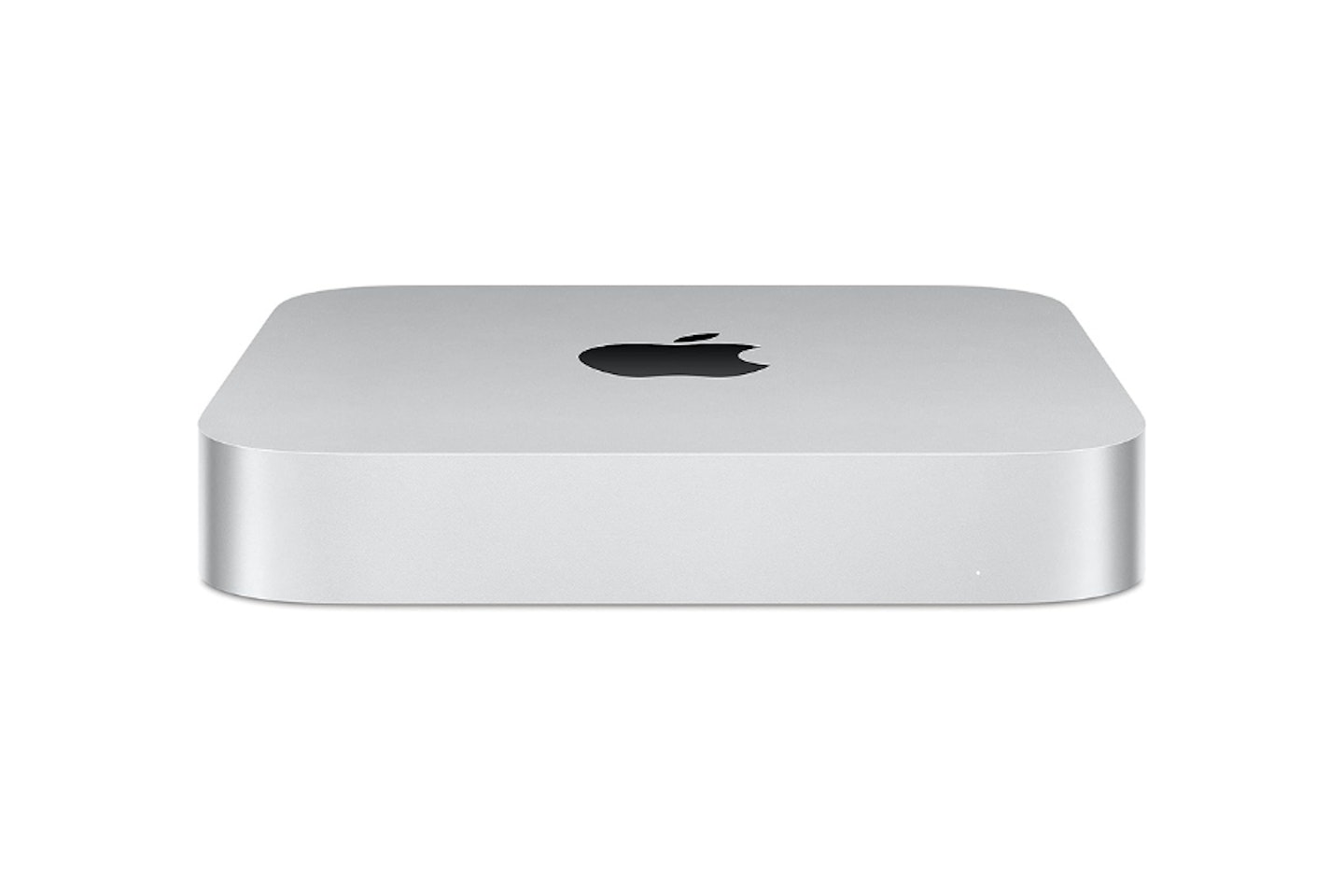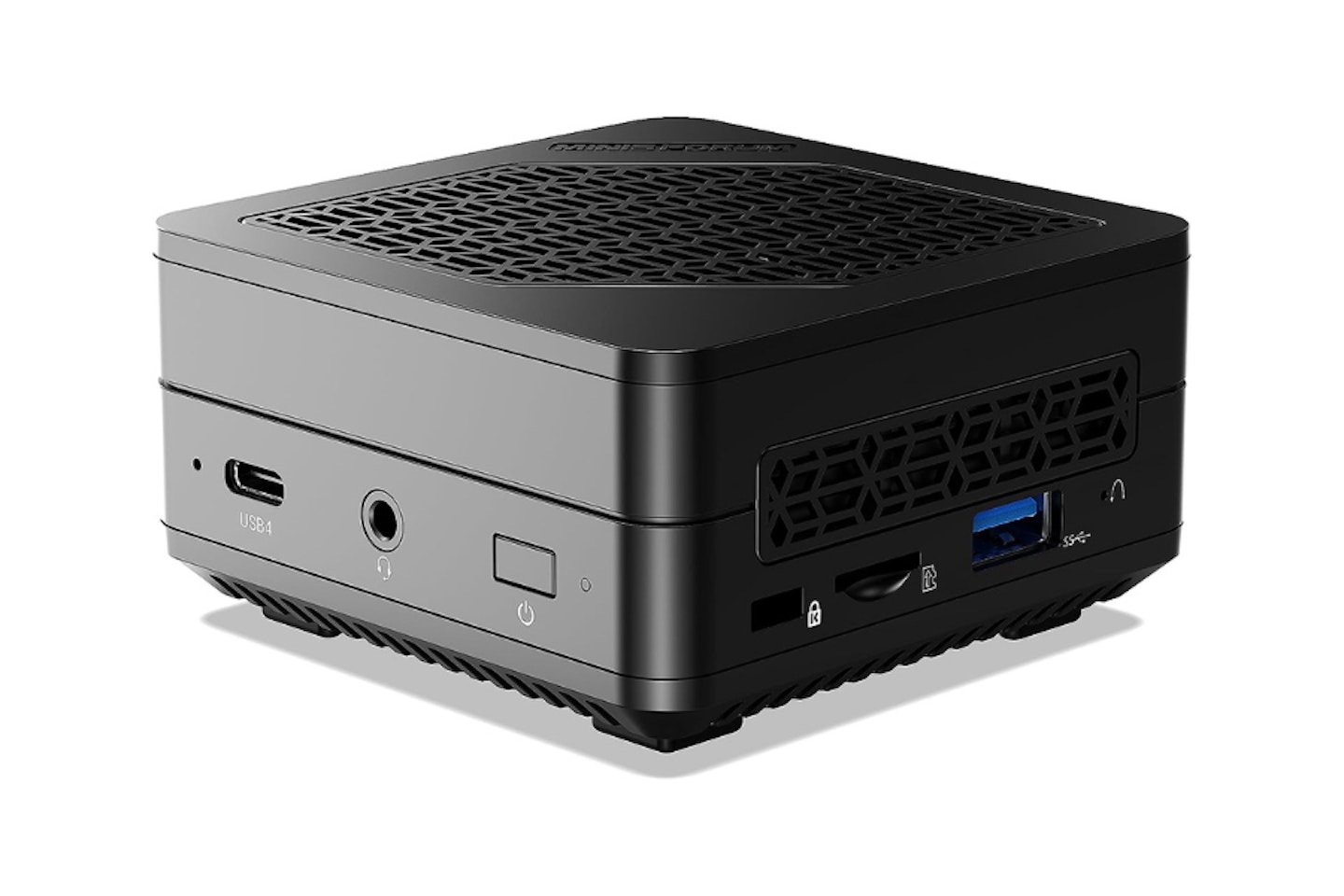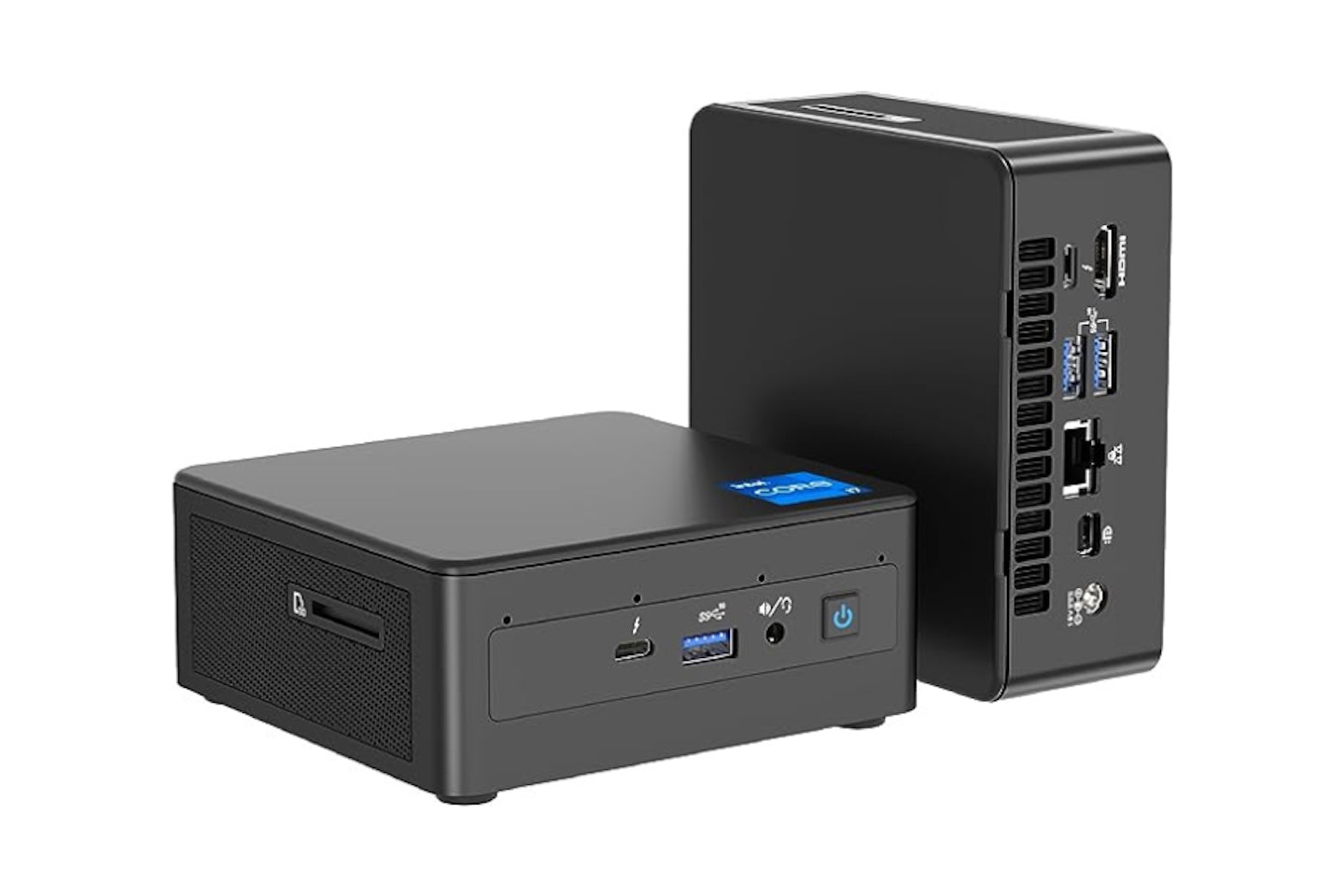Choosing the best laptops for your money this year might sound like a walk in the park, but you'd be mistaken – even more so when you're shopping for a computer. While you may fancy a luxurious high-end gaming PC rig aglow with RGB lighting, sometimes a cheaper, more practical, yet equally powerful option is preferable. Enter the mini computer.
Mini PCs are storming their way into the gaming, office and video editing markets in large part due to their versatility (thanks to their size), their clean and clutter-free aesthetics and, above all, their value. These deceivingly adorable mini PCs might only be a fraction of the size of a regular desktop, but they certainly make up for it with plenty of hardware heft.
The best mini-computers of 2024 at a glance
• Best overall: Apple 2023 Mac mini desktop computer – View at Amazon
• Best budget: NiPoGi Mini PC Windows 11 Pro – View at Amazon
• Best under £500: Minisforum Mercury EM680 – View at Amazon
• Best for gaming: NiPoGi AM08PRO – View at Amazon
Hundreds of professionals, gamers or those in need of a reliable desktop are switching over to mini PCs for their sheer convenience – the power of a home PC that can comfortably fit in your backpack, no questions asked.
Our picks range from the ultra-cheap at less than £200 up to £700 – so whether you're picking between the most expensive options on our list, you're still getting a great ultra-portable PC for less than £1,000.
The best mini-computers in 2024
All prices are correct at the time of writing. Prices, stock and deals are subject to change without notice.
Best overall
Though not technically a PC, Apple's Mac Mini is a slick, stellar option for office workers in need of some compact computing power.
An excellent mini PC that packs a performance punch, the Mac Mini is equipped with an excellent M2 Bionic chip, offering enormous power in a mini case. Though the Mini M2 is particularly small, its 8GB of RAM and 256GB of SSD certainly make up for its stature. If that isn't enough for you, there are other models with more storage, more RAM or even a better processor like the M2 Pro are available.
Solidly designed, polished and adorned with the iconic Apple logo - the Mac Mini looks stunning.
Pros
- Seamless Apple design
- Incredibly portable
- Gorgeous 4K support
Cons
- Storage is disappointing at this pricepoint
| CPU | Apple M2 |
| GPU | Integrated M2 |
| RAM | 8GB |
| Storage | 256GB |
| Dimensions | H35.8 x W197 x D197mm |
| Ports | 2x Thunderbolt 4 USB, 2x USB 3.1 (Type A), 1 x Ethernet, 1 x HDMI, 1 x 3.5mm Audio Jack |
| Weight | 1.18kg |
2.
NiPoGi Mini
Best budget
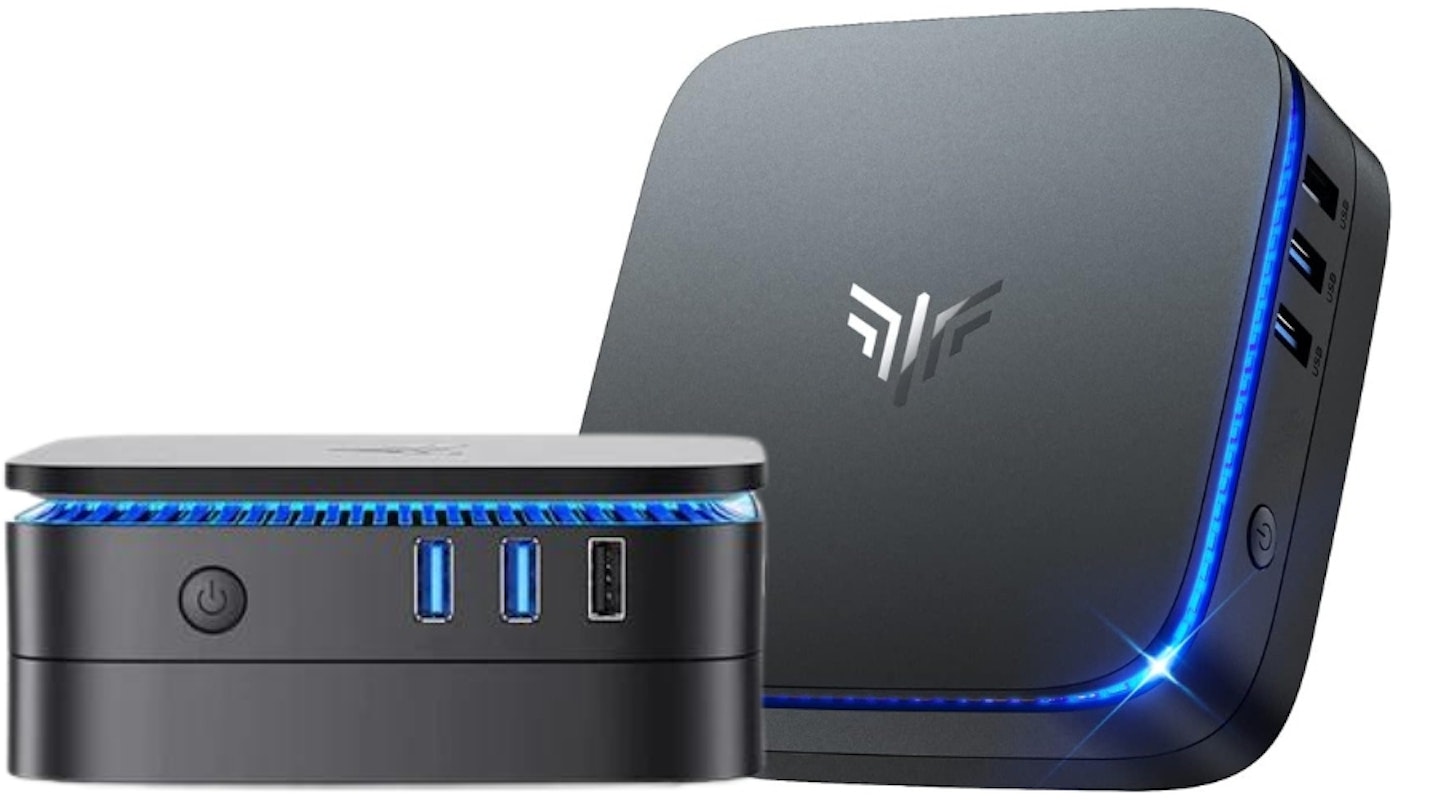 NiPoGi
NiPoGiCheap, simple, and the perfect solution to your snug desk needs, the NiPoGi Mini PC is a breath of fresh air in an absurdly affordable mini PC design.
Out of the box, the NiPoGi mini PC has some surprisingly decent tech under the hood, able to support 4K video right out of the box, something that is largely unheard of amongst budget PCs, let alone mini PCs.
While NiPoGi's RAM is undoubtedly something to garner buzz amongst tech enthusiasts, its onboard Intel Alder Lake-Ν95 CPU leaves a bit to be desired. A twelfth-generation Intel CPU with a top clock speed of 3.4GHz – this CPU isn't breaking many records for performance.
Yet, what else is to be expected from its price? Forgoing the low-end CPU, the NiPoGi mini PC has enough RAM for some intensive multitasking and while it may have some lacklustre internal storage, NiPoGi's Mini PC is an undeniable bargain with some roughness around its edges.
Pros
- Affordable, yet powerful mini PC
- Plenty of connectivity
- Excellent storage
Cons
- Fairly cheap build quality
| CPU | Intel 12th Gen Alder Lake N95 |
| GPU | Intel UHD Graphics 1.20GHz |
| RAM | 8GB DDR4 |
| Storage | 256GB SSD |
| Dimensions | H140 x W140 x D45 mm |
| Ports | Ethernet, x4 USB, x2 HDMI, x1 Ethernet, x1 3.5mm jack |
| Weight | 309g |
Best under £500
The perfect mini office PC at a competitive price, the Minisforum UM690Pro is a small yet mighty mini PC worth investing in for that extra desk space you've dreamed of.
Visually subtle and stealthy for those who'd prefer to avoid the blinking and flashing of a fully RGB gaming PC – you'll barely notice that the Minisforum UM690Pro is even there, lending to a seamless modern desktop aesthetic.
As for hardware, the UM690Pro packs a punch thanks to its 32GB of RAM and AMD Ryzen 9 6900HX CPU which is simply spectacular. Where storage is concerned, you've also got 1TB of SSD, which seems unfathomable for the size of the desktop. This monstrous storage space lends itself well to large creative projects or heaps of data from your day job.
Mighty as the Minisforum UM690Pro's hardware may be, its case certainly is not. The overall feel is somewhat flimsy, with a design that lacks refinement and is instead practical. That being said, the UM690Pro has enough going for it in terms of performance to almost entirely outweigh its setbacks, but it's certainly something to consider before investing.
Pros
- Great hardware
- Plenty of connectivity for external devices
- Very small mini PC for even smaller setups with VESA mounting options
Cons
- Cheap-feeling PC case
| CPU | AMD Ryzen 9 6900HX (8 core) |
| GPU | AMD Radeon 680M |
| RAM | 32GB DDR5 |
| Storage | 1TB SSD |
| Dimensions | H181 x W162 x D116 mm |
| Ports | 4x USB, 2x USB-C, 1x HDMI, 1x DisplayPort, 2x Ethernet, 1x 3.5mm jack |
| Weight | 1.55 kg |
Best for gaming
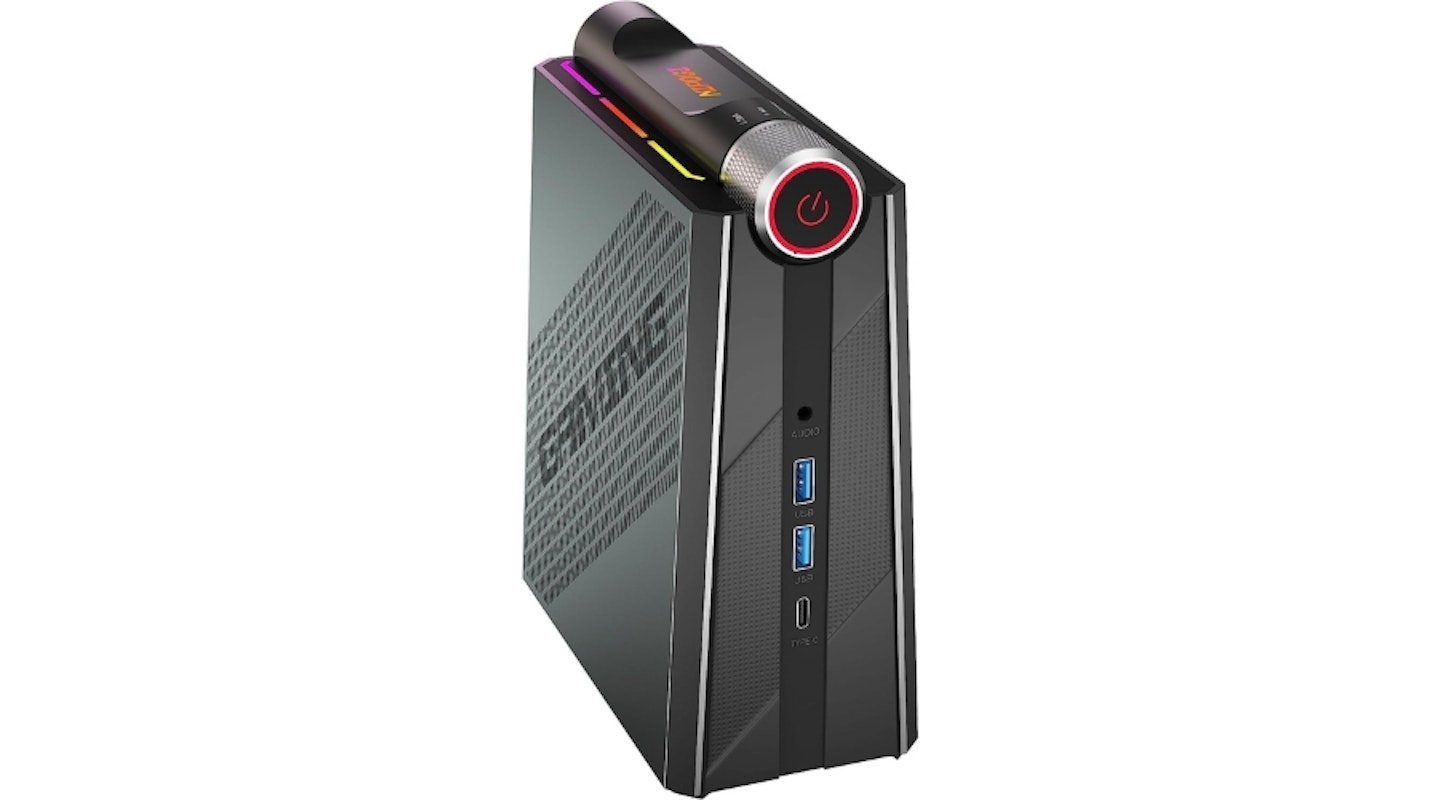 Amazon
AmazonAnother entry from NiPoGi, this is one of the most reviewed (and highly-rated) mini PCs on Amazon. Featuring an array of eye-catching RGB lights all across the small case, this packs in the features on the inside as well as the outside. The AMD CPU and integrated graphics are more than enough to handle 4K gameplay at 60Hz, and even support VR gaming. This outpaces many other desktop PCs, and to do so in such a small footprint is very impressive.
Though the storage is a little underwhelming, there is the possibility of upgrading internal storage with an SSD later in the lifespan of the mini-computer. But with the 32GB of DDR5 memory, you won't be needing more RAM anytime soon.
As for anything outside of gaming, it can handle anything from spreadsheets to CAD files. There's no task too big for this tiny PC.
Pros
- Can handle 4K 60Hz gaming as well as VR
- Fast RAM, and a lot of it
- Easily expandable internal storage
Cons
- Fan noise can get quite loud
| CPU | Ryzen 7 7735HS |
| GPU | AMD Radeon 680M |
| RAM | 32GB DDR5 |
| Storage | 512GB M.2 SSD |
| Dimensions | H154.3 x W77.8 x D77.8 mm |
| Ports | 4x USB, 1x USB-C, 2x HDMI, 1x Ethernet |
| Weight | 830g |
Best versatile
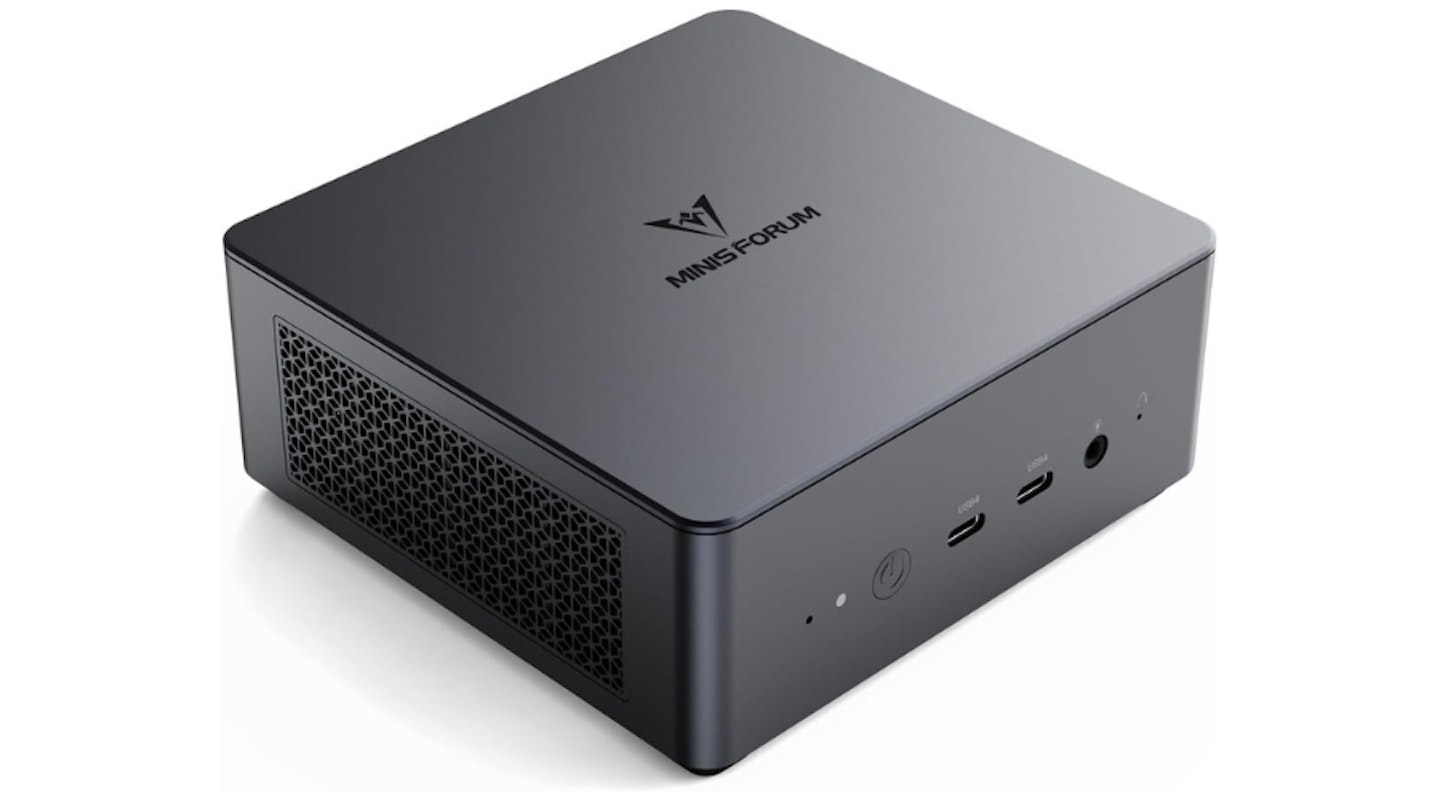 Amazon
AmazonFor those in need of slick aesthetics and reliable build quality, Minisforum Venus UM790 Pro has some of the best build quality amongst mini PCs on the market. A simple, glossy and smart design that exudes a solid feel, the Venus UM790 is cut from a different cloth compared to the droves of cheap-feeling mini PCs available.
But its quality doesn't end there, under the hood there are some truly brilliant tech specs – 32GB of DDR5 RAM, an AMD Ryzen 9 CPU and even its own dedicated AMD Radeon 780M graphics card – performance on the Venus UM790 Pro is impressive.
A great mini PC for video editing, despite its less than £700 price, there are really very few holes to poke in the UM790 Pro's almost flawless design. If we were to nitpick, however, the Venus UM790's components, much like most laptops, are soldered on. Consequently, you're not given the option to swap and upgrade once the mini PC begins to gather dust.
While this is normal for many mini PCs, it's certainly an option that would take the Minisforum Venus UM790 Pro to the next level.
Pros
- Gorgeous PC case
- Multiple HDMI ports for multi-monitor connectivity
- Great hardware
Cons
- Lack of customisation options thanks to soldered components
| CPU | AMD Ryzen 9 7940HS |
| GPU | AMD Radeon 780M |
| RAM | 32GB DDR5 |
| Storage | 1TB SSD |
| Dimensions | H130 x W126 x D52.3mm |
| Ports | x4 USB, x2 USB-C, x2 HDMI, x1 Ethernet |
| Weight | 1.77 kg |
Best Intel mini-computer
Not the most exciting option considering visuals and value, this reliable Intel Mini PC does exactly what it says on the tin. A standard PC with 16GB of RAM with good connectivity for a range of USB sticks and peripherals, and most importantly, a wonderful 11th-generation Intel i7 processor, The Intel Mini PC is everything you will need for a productive, lag-free workday.
Design-wise, its exterior certainly leaves much to be desired – its thin plastic shell does little in the way of protecting its hardware, nor does it give a premium feel that other mini PC cases do. When you buy this PC, you're buying the security the Intel brand provides, and the reassurance you'll be able to RMA it should something go wrong.
Pros
- Great CPU performance
- Good connectivity
- Decent storage space
Cons
- Lower RAM for price compared to other options at this pricepoint
| CPU | Intel i7-1165G7 (4 core_ |
| GPU | <span class="a-list-item"> Intel Iris Xe Graphic</span>s |
| RAM | 16GB DDR4 |
| Storage | 512GB SSD |
| Dimensions | H194 x W177 x D144 mm |
| Ports | x3 USB, x2 Thunderbolt 3, x1 Ethernet, x1 HDMI, x1 Mini DisplayPort, x1 3.5mm jack, x1 SD card slot |
| Weight | 1.64 kg |
Best handheld
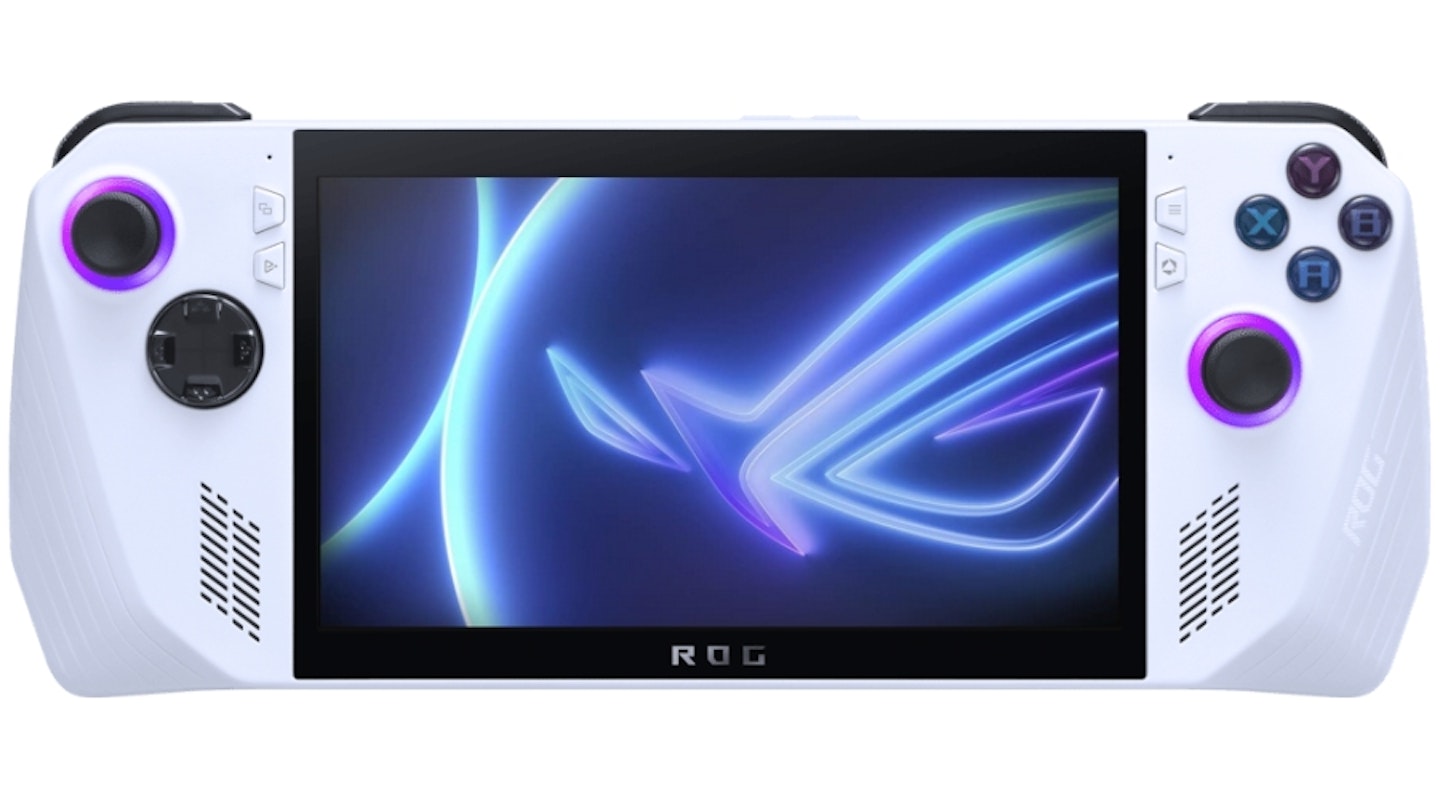 ASUS
ASUSWhile it may be designed for gaming, the ASUS ROG Ally uses the Windows 11 operating system, making this a PC you can fit in your pocket, equipped with an HD 120Hz touchscreen, 16GB of LPDDR5 memory and an AMD Ryzen™ Z1 Extreme Processor with a whopping 8 cores. ASUS pack the features into this tiny package, supporting AAA-level gaming or just regular internet browsing. However, with the limited ports that this device can support, working on spreadsheets on the go may be a little trickier.
The ROG Ally acts almost like a PC version of the Nintendo Switch, packing everything into something that can be used on a plane, train, or on your desktop just as easily. The power button doubles as a fingerprint sensor, ensuring whatever you do on it will be protected from prying eyes. While it comes with integrated speakers (and a mic) there is also a 3.5mm headphone jack for keeping your noise to a minimum on a crowded bus ride.
Somehow they manage to fit all of this into such a small item, but there aren't concessions to be made. There are a lack of ports available on the back, so playing and charging at the same time might be tricky (though they've learned from the Switch and made sure it wasn't on the bottom, at least). There are also other options in the portable gaming scene, such as the Steam Deck or Lenovo Legion Go, both have their own upsides and downsides.
Overall, with some compromises for the standard PC experience, you'll not find a more compact PC experience than this.
Pros
- Extreme portability, everything you need to browse in your pocket
- AAA gaming-level hardware
- Incorporated microphone and speakers
Cons
- Design is very "gamer" inspired
| CPU | AMD Ryzen Z1 (8 core) |
| GPU | AMD Radeon RDNA3 |
| RAM | 16GB DDR5 |
| Storage | 512GB SSD |
| Dimensions | H280 x W111 x D21.2 mm |
| Ports | x1 USB-C (used for power too), x1 Micro SD-card slot, x1 3.5mm jack, x1 ROG XG mobile interface |
| Weight | 608 g |
Mini PC vs desktop – what's the best?
Mini PCs are chock-full of amazing advantages that'll work wonders for those who commute regularly or are in need of some additional office space. Not only that, they're also absurdly cheap compared to both their laptop and PC desktop counterparts, with many options having 32GB of RAM for less than £500.
Mini PCs, however, suffer from a lack of repairability – they can be opened up, but their hardware (for the most part) is soldered onto the motherboard. Standard desktop PCs, by contrast, are made to be taken apart, with practically each and every component being replaceable and upgradable. This gives them a practically limitless lifespan.
Desktop PCs also have greater connectivity due to the more space for ports. The size also allows more ventilation and less chance of components overheating.
Where value is concerned, a mini PC might be better for you, but for longevity and more options for peripherals, desktop PCs are always a reliable choice.
Mini PC vs laptop – what's the best?
As for this debate, once again, there's no clear winner. Laptops can be considerably more expensive than they ought to be, with hardware that simply doesn't match their price.
Mini PCs, however, are simply powerful out of the gate, often having a lot more RAM at their disposal compared to both desktops and laptops.
The advantage of an excellent laptop, though, is that it's even more portable than a mini PC. Working on the go with a mini PC isn't quite as easy as it is with a laptop – you need a lot of components such as a great budget PC monitor. You'll also need an especially great keyboard and a mouse before you can even begin to browse on a mini PC, whereas a laptop has everything you need all in one unit.
What should I look for in a mini PC?
A great mini PC should have a decent amount of RAM, at least 16GB considering modern computing requirements.
There should also be some sort of reliable CPU to deliver solid multitasking (something that'll be a lifeline if you're planning on working).
Storage is also a necessity – gamers, office workers and video editors alike, you'll need at least 512GB of storage to last you a good while, although buying external storage is also an option.
Finally, a solid amount of ports will be revolutionary, you'll need them for USBs, plugging in smartphones, cameras and other peripherals for work, so make sure you've got at least three available.
Why should you trust us?
At What's The Best, our mission is to provide accurate and reliable reviews, ensuring our readers receive honest and transparent information about the best technology products available. Anything less would undermine our commitment to being a trusted source of unbiased product information.
Our dedicated in-house writing team comprises experts with extensive experience and a genuine passion for technology. Collectively, we have spent decades testing and writing about tech, leveraging our expertise in all our articles, advice pieces and reviews.
We maintain complete editorial independence and do not accept payment for product reviews. Our writers have full control over their content, ensuring that products are selected based solely on the needs of our readers. While we may earn commissions or other compensation from links on our website, this never affects our product choices. These links enable us to continue offering valuable consumer advice, without compromising the integrity of our reviews.
Ryan Houghton is a Tech Writer and Reviewer for What’s The Best, known best for his expertise in gaming, with a particular soft spot for PC gaming, audio tech, televisions and smartphones.
Diligently writing for What’s The Best for almost two years, there are very few tech products Ryan hasn’t had his hands on to review; televisions, headphones, folding phones and even LEGO, if it’s nerdy, he’ll be there.
His well-versed history as one of the resident techies at What’s The Best has kept him keen to uncover the very best deals, savings and offers for those in need of a cracking deal to upgrade their setup.
In his downtime, Ryan most likely has his nose buried in a fantasy book, or his eyes glued to a screen whilst playing a tough-as-nails Soulslike or leisurely RPG, indulging in most forms of escapism where possible.
Subscribe to the What’s The Best Newsletter to keep up to date with more of the latest reviews and recommendations from the rest of the What’s The Best team.

